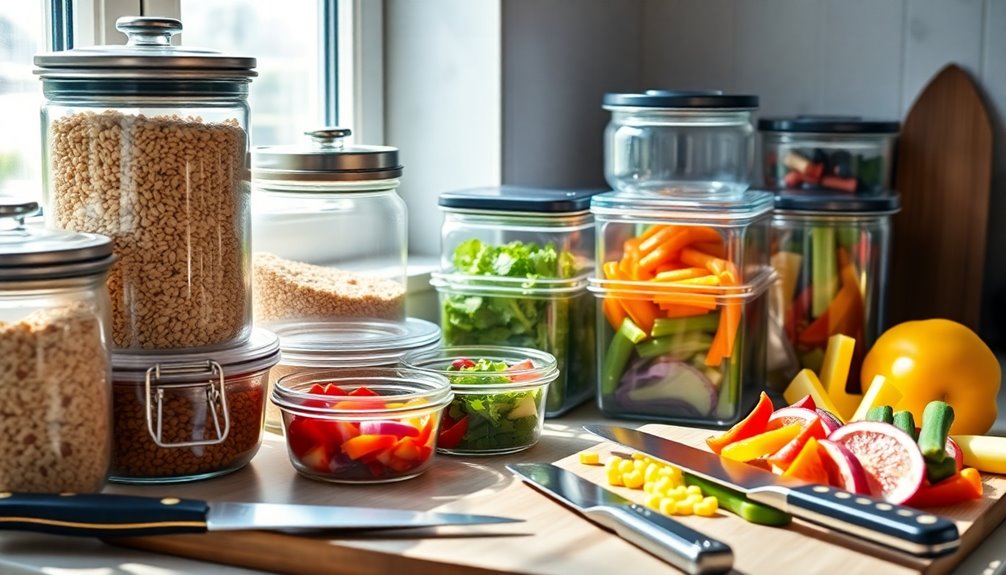To save time and money with meal prep, start by planning your meals ahead. Organize a shopping list that aligns with your meal plan to avoid impulse buys. Batch cooking is a powerful technique; prepare multiple meals in one go using a slow cooker or freeze portions for later. Smart storage solutions, like clear containers and labels, help keep your meals fresh and organized. Don't forget to repurpose leftovers creatively, transforming them into new dishes. Implementing these strategies can lead to significant savings, and there's a wealth of additional tips out there to enhance your meal prep experience.
Key Takeaways
- Create a detailed meal plan to streamline your cooking routine and reduce stress throughout the week.
- Organize your shopping list by recipe categories to ensure efficient browsing and to stay within budget.
- Implement batch cooking techniques using a slow cooker or freezer meals for time-saving benefits.
- Utilize smart storage solutions like clear, labeled containers to keep meals fresh and easily identifiable.
- Repurpose leftovers creatively to minimize waste and save both time and money on meals.
Plan Your Meals Ahead
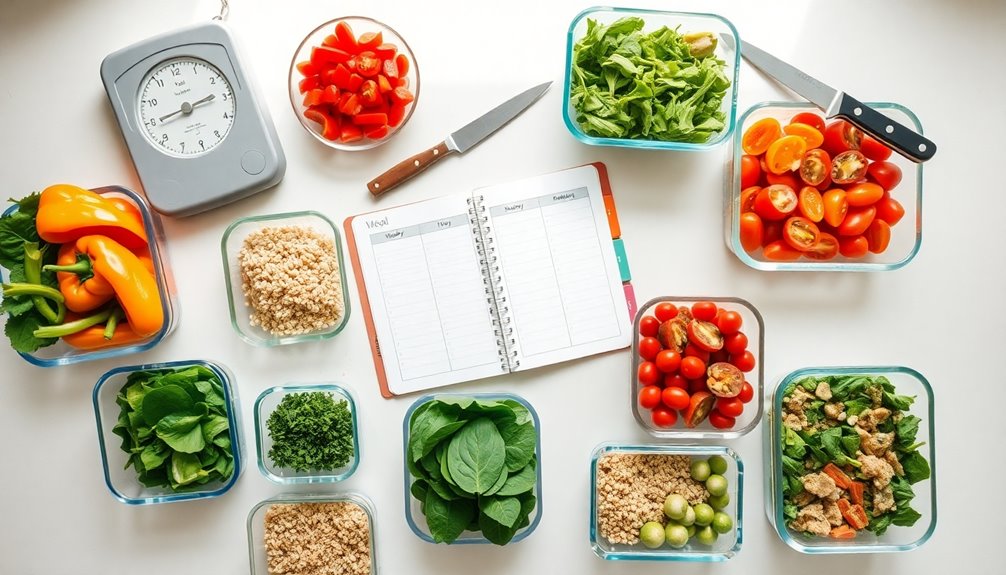
Planning your meals ahead can greatly streamline your weekly routine and reduce stress. When you take the time to organize your recipes, you're setting yourself up for success. Start by gathering your favorite recipes and categorizing them—think breakfast, lunch, dinner, and snacks. This recipe organization not only helps you know what to cook but also minimizes the time you spend deciding what to eat.
To make meal prep even more effective, consider batch cooking. Choose a day, like Sunday, to prepare multiple meals at once. This simple time-saving tip can free up your evenings during the week, allowing you to enjoy more time with family or focus on your hobbies.
Additionally, when you cook larger portions, you can repurpose leftovers creatively, saving both time and money.
Another effective strategy is to use a meal planning template or app. These tools can help you visualize your week, making it easier to plan balanced meals. You can even share your meal plan with friends or family, creating a sense of community around cooking.
When you involve others, you're not only sharing the load but fostering connections that can enrich your culinary experience. Moreover, incorporating plant-based recipes into your meal prep can enhance your overall health and vitality.
Lastly, always keep a list of your go-to quick recipes on hand. These can be lifesavers on days when time is tight. By implementing these meal planning techniques, you'll not only enhance your cooking skills but also cultivate a more organized and fulfilling weekly routine.
Create a Shopping List
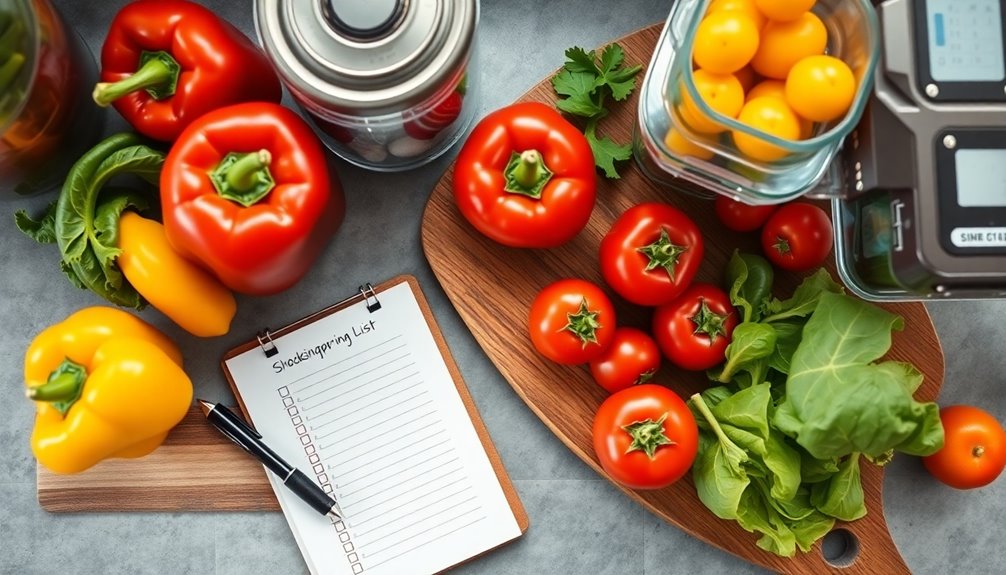
Start by creating a shopping list that aligns with your meal plan to guarantee you have everything you need for the week. This step not only streamlines your grocery shopping but also supports your grocery budgeting efforts. By keeping your list organized, you can prevent impulse buys and stick to what matters most.
To effectively organize your recipes, categorize your shopping list into essential groups. This approach enhances efficiency while browsing the store. Here's a simple table to help you structure your list:
| Category | Items |
|---|---|
| Proteins | Chicken, tofu, beans |
| Vegetables | Spinach, bell peppers |
| Grains | Rice, quinoa |
| Dairy/Alternatives | Almond milk, yogurt |
When you create a list, you'll find that it's easier to stay focused. Having everything in one place ensures that you don't overlook any ingredients for your recipes. Plus, it fosters a sense of belonging as you engage with your community through shared meal prep ideas or by exchanging recipes with friends and family. Incorporating whole-food sources of protein into your meals can further enhance your nutritional intake and support your wellness goals.
Batch Cooking Techniques
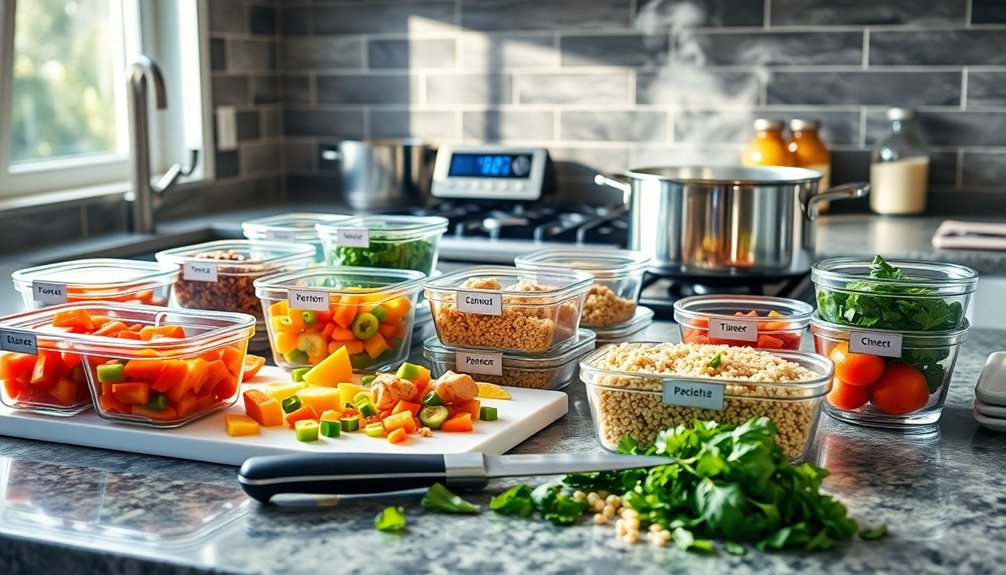
When you engage in batch cooking, you'll discover a time-saving method that saves both effort and money throughout your week. This approach lets you prepare multiple meals at once, freeing up your schedule for more enjoyable activities. To get started, consider making a few slow cooker meals. These dishes are perfect for batch cooking because you can throw in your ingredients, set the timer, and let the slow cooker do the work while you focus on other tasks.
Next, think about freezer meals. By preparing larger portions of your favorite recipes, you can store leftovers in meal-sized containers for later use. This not only reduces food waste but also guarantees you have nutritious options on hand when you're short on time. Aim for a variety of proteins, grains, and vegetables to create balanced meals that can easily be reheated.
To make the most of batch cooking, plan your meals for the week ahead. Choose recipes that share similar ingredients to streamline your shopping list and cooking process. When you cook in bulk, you'll find that meal prep becomes quicker and less challenging. Plus, sharing your batch-cooked creations with family or friends can foster a sense of community and belonging.
Incorporating these batch cooking techniques not only simplifies your week but also helps you stick to your budget. Additionally, by utilizing the Smoothie Diet's meal replacement strategies, you can easily incorporate healthy smoothies into your batch cooking routine. Embrace this efficient method, and you'll soon reap the rewards of both time and money saved!
Smart Storage Solutions
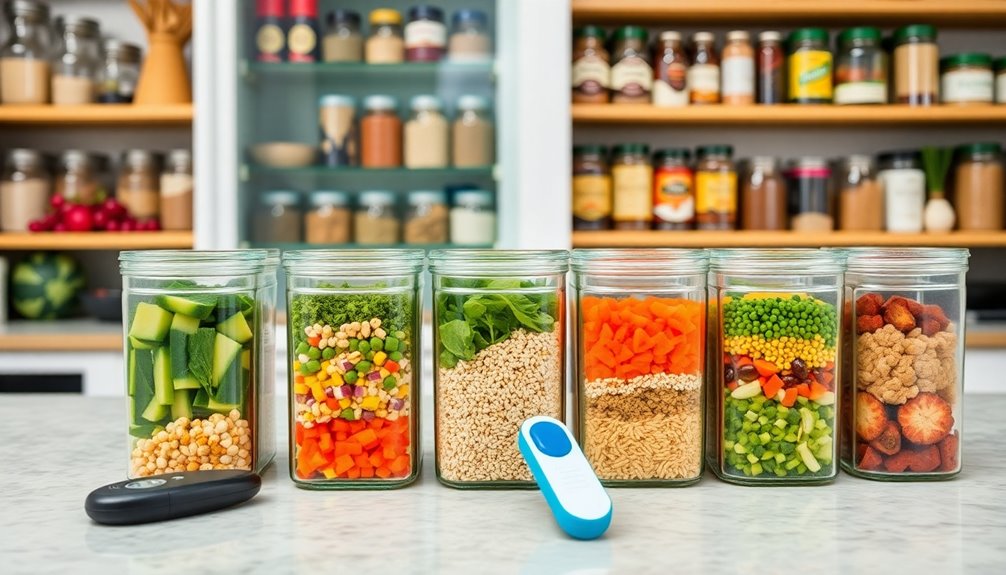
Effective organization is key to maintaining a streamlined meal prep routine, and smart storage solutions play an essential role in this process. When you optimize your container organization, you not only save time but also enhance the freshness of your meals. Here are some practical tips to get you started:
- Use Clear Containers: Choose transparent containers that allow you to see what you have at a glance, reducing the time spent searching for ingredients.
- Label Everything: Use labels to mark the contents and date of each container. This practice aids in meal identification and minimizes food waste.
- Stackable Options: Invest in stackable containers to maximize vertical space in your fridge and pantry. This makes for easier access and better organization.
- Freezer-Friendly Choices: For freezer organization, opt for containers specifically designed for freezing. They should be airtight and durable to prevent freezer burn.
Additionally, incorporating smart meal prep techniques can further enhance your efficiency, similar to how mini bands provide a comprehensive body sculpting experience.
Utilize Leftovers Effectively
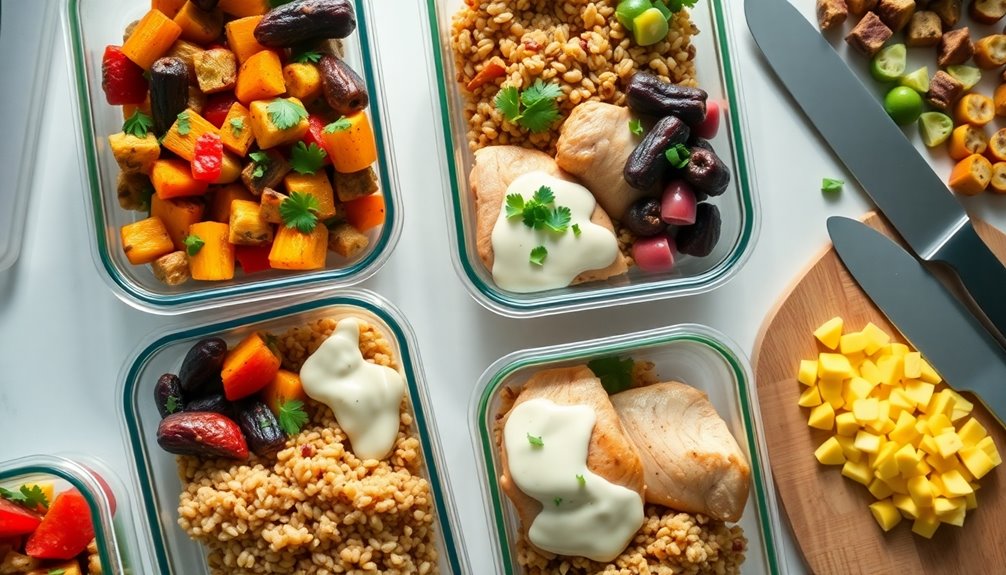
Smart storage solutions set the stage for making the most of your meal prep, but utilizing leftovers effectively takes your efforts a step further. Repurposing leftovers can save you both time and money, turning what could be waste into delicious, creative meal ideas.
Instead of letting that half-eaten roasted chicken or those extra veggies linger in your fridge, think of ways to reinvent them. For instance, leftover chicken can be transformed into a hearty chicken salad or a flavorful stir-fry. Simply chop it up, toss in some fresh greens, and add your favorite dressing for a quick lunch.
Those extra veggies? They can easily become a vibrant vegetable soup or a savory frittata. It's also helpful to keep a "leftover night" once a week. This not only encourages creativity in the kitchen but fosters a sense of community, as you can invite friends or family to bring their leftovers, creating a potluck-style dinner.
Additionally, consider freezing portions of your meals. This way, you'll have convenient, ready-to-eat options on hand, eliminating the temptation to order takeout when you're short on time. Moreover, utilizing glute-specific movements during your workout can enhance your overall strength and performance, making your meal prep efforts even more rewarding.
Embracing these strategies for repurposing leftovers not only stretches your grocery budget but also allows you to enjoy a variety of meals throughout the week. So, next time you look at those leftovers, remember: they're not just scraps; they're opportunities for delicious, budget-friendly meals.
Frequently Asked Questions
How Can I Make Meal Prep Enjoyable and Not a Chore?
To make meal prep enjoyable, you can start exploring creative recipes that excite your taste buds. Try new cuisines or seasonal ingredients to keep things fresh. Combine this with time-saving tips, like batch cooking or using one-pot meals, to simplify the process.
You'll find that prepping becomes a fun activity rather than a chore. Invite friends or family to join in, turning it into a shared experience that fosters connection and creativity.
What Are the Best Containers for Freezing Meals?
When it comes to preserving your culinary creations, choosing the right containers can make all the difference. Opt for reusable containers that fit your needs—they're eco-friendly and budget-savvy.
Look for options with tight-fitting lids to avoid spills. Consider ones that promote portion control, helping you manage serving sizes effortlessly.
Glass containers are great for reheating, while BPA-free plastic options are lightweight and convenient. With the right containers, you'll make meal storage a breeze.
How Do I Prevent Food Waste While Meal Prepping?
To prevent food waste while meal prepping, focus on creative recipes that use similar ingredients, ensuring you utilize everything you buy.
Practice portion control by measuring out servings to avoid over-prepping meals you won't eat.
Incorporate leftovers into new dishes to keep meals interesting and reduce waste.
Keeping a clear inventory of what you have can also help you plan effectively and use up ingredients before they spoil.
Can I Meal Prep for Dietary Restrictions or Allergies?
Absolutely, you can meal prep for dietary restrictions or allergies! Start by creating customized recipes that cater to your specific needs. Research and experiment with ingredient substitutions to guarantee your meals are both safe and delicious.
For instance, if you're gluten-free, swap regular pasta for zucchini noodles. By planning ahead and being mindful of your ingredients, you'll enjoy tasty meals while feeling confident that they align with your dietary requirements.
How Long Can I Store Prepped Meals in the Fridge?
You can safely store prepped meals in the fridge for about three to four days if you use proper storage methods. Make certain to keep them in airtight containers to maximize shelf life and prevent spoilage.
Always check for any signs of spoilage before consuming, and if you're uncertain, it's better to err on the side of caution.
Following these guidelines helps guarantee your meals stay fresh and safe for you and your loved ones.
Conclusion
By implementing these meal prep hacks, you'll streamline your shopping, savor savings, and simplify your weeknight dinners. Planning your meals, crafting a meticulous shopping list, and embracing batch cooking can significantly decrease your time in the kitchen and keep your budget in check. Plus, smart storage solutions and savvy use of leftovers guarantee nothing goes to waste. So, start today and savor the satisfaction of smarter, simpler meal prep that saves time and money!

